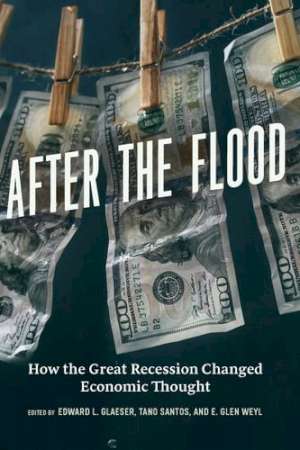09 July 2018
After the Flood
How the Great Recession changed Economic Thought
Edited by E Glaser, T Santos and E G Weyl
2017, University of Chicago, 304 pages,
ISBN 9780226443546
Reviewer: Bridget Rosewell, Volterra Partners & Atom Bank

This book is not what I expected, since it is not really about economic thought, but rather a collection focused on a variety of reflections on economic issues and is, in effect, a Festschrift for Jose Scheinkman. Papers cover such matters as asset pricing and bank controls as well as expectations formation. The last paper, by Weyl, which looks at how economists’ research interests are affected by policy and consultancy opportunities, is the one which most concentrates on the formation of economic thought. He finds that finance economics and consulting have largely focused on the descriptive and ‘positive’ rather than the ‘normative’ side of analysis, while industrial organisation literature is concentrated on normative questions of policy and its implementation.
He looks at this through text analysis and examining the non-academic activity of his authors. He might just as easily have looked at where economists are employed outside academia! If I look at the firms that employ economists, they are engaged on the one hand in producing economic impact studies for policy or for public inquiries. On the other hand, they may work for banks, or the firms that produce forecasts and studies of macroeconomic trends. In government, both are possible. Interestingly, it is not clear that the activities in any of these fields have yet been affected much by the great recession.
Weyl asks an interesting question about the direction of causation between economists’ interests and consulting assignments, but concludes that it is unclear. Perhaps this is an area where the SPE itself should undertake some thinking. Do we get the best advice from academics? How do we ourselves ensure that we are taking onboard new thinking in the advice that we give? These are important questions and I was sorry that the book only reached this area at the end.
The early part, by contrast, is entirely focused on finance, and it is not very obvious how these papers are reacting to the great recession and how it affects economic thought. Rather the papers focus on the possible policy implications for the control of financial institutions, whether by pay limitations or by contingent capital. I was rather disappointed by Bolton’s essay on the Good Banker. He concludes that a good banker can be interested in trading and fee-based services and that this adds value especially in systemically important institutions. Since these rest in turn on government back-stops, they necessarily become semi-public institutions. I’m not at all clear how a fee-based trading bank is supposed to be a semi-public institution. I would have liked to see some reflections on the Vickers report and the proposals for ring-fenced banking which go entirely in the other direction in wishing to insulate the taxpayer from the trading, fee-based, kind of bank.
Banking regulation is based on theories – often economic – about how people behave, the incentives that they react to and how to control these. I might argue that banks became too prone to believe that only money worked as an incentive and regulators followed, focussing on short and long term incentive schemes, bonus management and fines. More recently, culture has come into play, and Bolton does reflect on the Salz report on Barclays. How should economists think about culture? We need to incorporate thinking about intrinsic as well as extrinsic reward when considering how people behave and when and how they are willing to call stop or get captured by a prevailing view. The crash uncovered behaviours which no one could have thought acceptable outside the culture that required one to keep dancing while the music played on. Which in turn leads one to think that structures such as contingent capital need to put into a cultural context as much as an economic one – a point Andy Haldane made in his Wincott lecture of 2011, which showed how each attempt to make banks absorb their own risks had been circumvented or ignored in due course.
Maybe I’m being unfair in expecting us yet to have incorporated the backwash of the great recession into economic thought. These papers certainly operate in fields where we could expect some impact such as theories of asset pricing, bank regulation and governance, expectations formulation, and the focus of academic research. This is a wide set of issues so perhaps it is not surprising that no clear theme emerges from the papers.
Scheinkman’s own work range does not help – he has delivered dynamic optimisation models and risk management modelling as well as looking at the interaction of decision-making of individuals and their institutions. And this is the real challenge for economists now. We don’t really know how to manage the economy, and the routes of policy work through people and their institutions as well as through models which abstract from peoples’ variability and treat them as atoms. The representative agent has been a useful fiction but still a fiction. When to abandon it, and when not, is the core of what these authors are really addressing. It’s a pity it doesn’t come over more.
